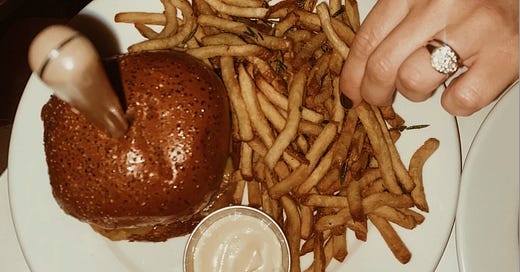I was sitting at the bar in a diner this past weekend when a little boy was asked by the waitress if he’d like some extra syrup with his pancakes. A short “yes” was retorted. I looked at my husband and added “please!”. The boy wasn’t corrected. Nor was he when the same response came to several other questions pertaining to his wellbeing and enjoyment over his Saturday brunch.
This little boy isn’t alone. The use - or lack - of two phrases so engrained into my mental architecture from the earliest of my speaking days, is, on a daily occurrence, astonishing to me in New York City. Last week, whilst waiting for my extra hot oat matcha latte from Yanni’s (best in New York City in case you’re wondering) to be whisked, a lady (maybe not quite Upper East Side, but close enough) proceeded to order and collect her own caffeinated concoction. Not once was a single “please” or “thank you” exchanged.
Much to people’s amazement, there’s a lot of cultural differences between the English and the American. I always warn clients eyeing up this side of the pond, that just because we speak the same language, doesn’t mean we’re cut from the same cloth. And indeed, this presents itself more obviously and more frequently than this amateur Substacker Englishwoman might care for when it comes to manners.
For a nation so fascinated by the Royal Family and the English class system, I assume the Americans have watched enough Jane Austen (heck, even Disney - The Princess Diaries come to mind) films to acquaint themselves with the very basics. So why is there such a glaring omission of three very simple, yet highly impactful words? In my opinion, the tipping culture.
I’m like any other English person flying over the pond. I hate tipping. Not because I don’t think someone deserves it, but because: a.) minimum 20%???! (it’s essentially another tax on top of government, state and city tax) b.) because it’s so expected that it actually doesn’t generate better service, and c.) it’s complicated. How much do you tip? When? For what? Everyone seems to have a different standard and no matter the situation, this resentful Brit always ends up looking as tight as Joan Rivers’ forehead.
So, how does tipping correlate, or in this case not correlate, to a thank you I hear you ask. After seven years living Stateside, you begin to unpack the socio-economic reality that, I presume, first preempted tipping in the first place. That, living on wages alone, many people in a service industry simply cannot make ends meet. Tipping, in literal terms the ‘service charge’, is not only a necessity, it’s a minimum 20% expectation, regardless of the service itself. Has the dilution of rewarding the actual performance replaced “thank you” with a tip? Does money speak louder than words? I pay you therefore you do.
The result is a societally imposed class system only compounded by the internal structure of the food and beverage industry. The bus boy, the server, the back bar, the host; how none of these can do the other’s job, how origin only fuels this hypothesis. When did nationality dictate that someone from one country was better at clearing plates than serving them? And, why does the latter warrant a generous tip, when the former pull the scraps (quite literally)? I’m told by a notable New York chef friend that tips are pooled and then distributed based on time spent at the table (mathematician headache setting in just trying to understand how this is calculated after each service). My retort to that is, if there wasn’t such a dichotomy in roles (i.e if wage was actually based on skill and servers could also clear like a UK structure), would we be cracking the system? Would everyone, in fact, take home their worth? Would tips be earned and fought for, rather than expected? Moreover, would a waitress in a diner trying to make ends meet warrant a “thank you”? Or would the much-loved, neighborhood barista that some (nearly) Upper East Side lady stumbled across whilst stepping out of her familiar stomping ground deserve a “please”?
I don’t have the answer. My husband reminds me that maybe it’s my own perception of it - could it be that Americans simply don’t expect “please” or “thank you”? I certainly expected a “thank you” when I let my manicurist keep the change (a 25% tip for the record), but it never came. For a nation so well trained in retorting “you’re welcome, my pleasure, of course, anytime”, I’m hedging my bets. As the Co-Founder of an Anglo-American agency, I don’t think there’s any coincidence that our most successful, long-standing employees all hail from the South.. you’ve heard of ‘Southern Hospitality’ - it comes with big smiles, perfect manners and a whole lot of please and thank yous.
I’m not saying “thank you” pays the bills but it sure doesn’t cost anything to say!
Oh and by the way, thanks for reading ;)





We live in the South, and you better believe people here have manners galore. ,y son knows he needs to say please and thank you and always thanks me for dimmer as well as anything as simple as me doing his laundry. Manners are a way of life in the South and most kids sent off to even a birthday party , are threatened by their parents to mind their manners and behave politely at the hosts’ home.
Absolutely loved this!